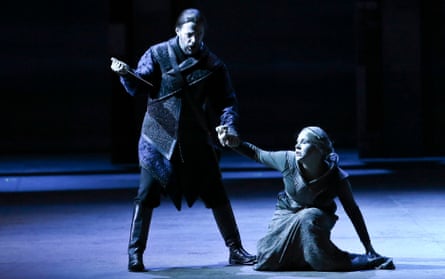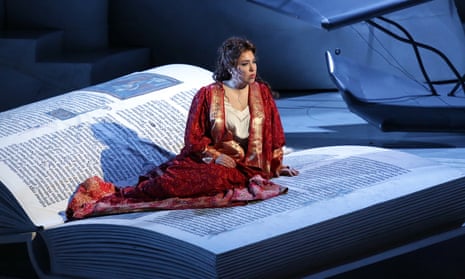Opera houses are increasingly loth to take artistic risks these days, for frustrating but wholly understandable reasons. With financial subsidies tight, familiar works and famous singers will shift tickets in a way that neglected repertoire and relative unknowns do not. Hence all those Traviatas, Toscas and Carmens in the recently announced 2018-19 Covent Garden season.
One of the continuing casualties of this era of caution is opera’s vast but fascinating neglected repertoire. There are lots of these overlooked operatic pieces, many of them by household-name composers, as a glance in any opera dictionary or guide will show. But with the exception of festivals such as Buxton and Wexford, which specialise in the rarity end of the operatic canon, there are very few chances to see them.
If you want to watch a professional performance of a neglected opera, you have to travel and be prepared to spend. Last month, I managed to catch two such rarities, of very different kinds, but it meant going to Italy.
Verdi’s I Lombardi alla Prima Crociata falls firmly into the category of lesser works by great composers. I Lombardi was Verdi’s fourth opera in a career that produced around 30 of them (the imprecision is deliberate because some of Verdi’s works, including I Lombardi, exist in various versions and revisions). Covent Garden has not put it on since 1976. New York’s Met not since 1993. But there is a new production at Turin’s Teatro Regio this season.
I Lombardi is a cobbled together historical tale of monumentally improbable coincidences woven into the exotic (and violent) world of the 11th-century crusades. A jealous brother kills his own father by mistake. A captive Italian girl is revealed as the long-lost daughter of Arvino the crusader commander. The exiled parricide Pagano turns out to be living as a hermit in a nearby cave. You get the idea.

Probably the most famous number comes near the end, when a chorus of crusaders appeals to God to save them from death as they approach Jerusalem. Their chorus “O Signore, dal Tetto Natio” was second only in popularity to the one from Nabucco in making Verdi’s name with the public. An 1880s visitor once heard farm labourers singing it “quite spontaneously” to the composer as he passed by in his horse and gig on his way to the railway station.
There is a notable Ave Maria scene for the soprano Giselda, written 44 years before the more famous one in Otello. And her suitor Oronte has one of Verdi’s earliest rapturous tenor arias. There’s a famous trio as he dies from his wounds. As a whole, though, I Lombardi doesn’t hold together. It is episodic, resulting in many pauses between scenes, it lacks the dramatic tautness of Nabucco, and its story of Christian heroism in the Muslim-dominated Holy Land is hard to take nowadays.
In bolder artistic hands, a producer might make something contemporary out of that uncomprehending cultural tension. But Turin’s director Stefano Mazzonis di Pralafera opted for a doggedly traditional staging of the sort Verdi would have recognised, which is often the safe option in a complex story familiar to few. Musically, however, it was another matter, with the conductor Michele Mariotti bringing a dynamism to his work in the pit that evoked Riccardo Muti’s command of this early Verdi repertoire 30 years ago. Angela Meade was an accomplished Giselda, Francesco Meli a full-blooded Oronte and Alex Esposito an authoritative Pagano.
There was a very different approach the following evening at La Scala in Milan. Unlike I Lombardi, Riccardo Zandonai’s Francesca da Rimini, first premiered in 1914, is a (relatively) neglected piece by a genuinely neglected composer. But where Turin had played it safe for I Lombardi, Milan went for broke, bringing in David Pountney to mount the first production of Zandonai’s opera there since 1959.
Such a director as Pountney was never going to produce a traditional setting for a work that sets a play by the terrifyingly egotistical and sex-obsessed Gabriele D’Annunzio that is erotic and brutal by turns. Milan’s boldness was rewarded. There was not a trace of the floral medieval settings in which Francesca is sometimes drowned. Instead, Pountney approached the piece through the prism of D’Annunzio’s scarily dark aesthetic. Love scenes were played out between the pages of a book of Arthurian poetry but the battles of the second act were staged with harshly futurist and phallic aggression. It is one of the best things Pountney has ever done.
That it worked so well, in a piece that can easily fall flat, owed at least as much to Fabio Luisi, who conducted a reading of unflagging conviction, securing electrifying playing from the La Scala orchestra. Maria José Siri was equally tireless as the adulterous Francesca. Marcelo Puente and Gabriele Viviani gave imposing interpretations of the brothers who are rivals for her bed. Shamefully, though, the Scala seemed only about half full on the second night of the run. It isn’t just the UK where opera audiences seem content to stick with what they know. What a lot they are missing.

Comments (…)
Sign in or create your Guardian account to join the discussion